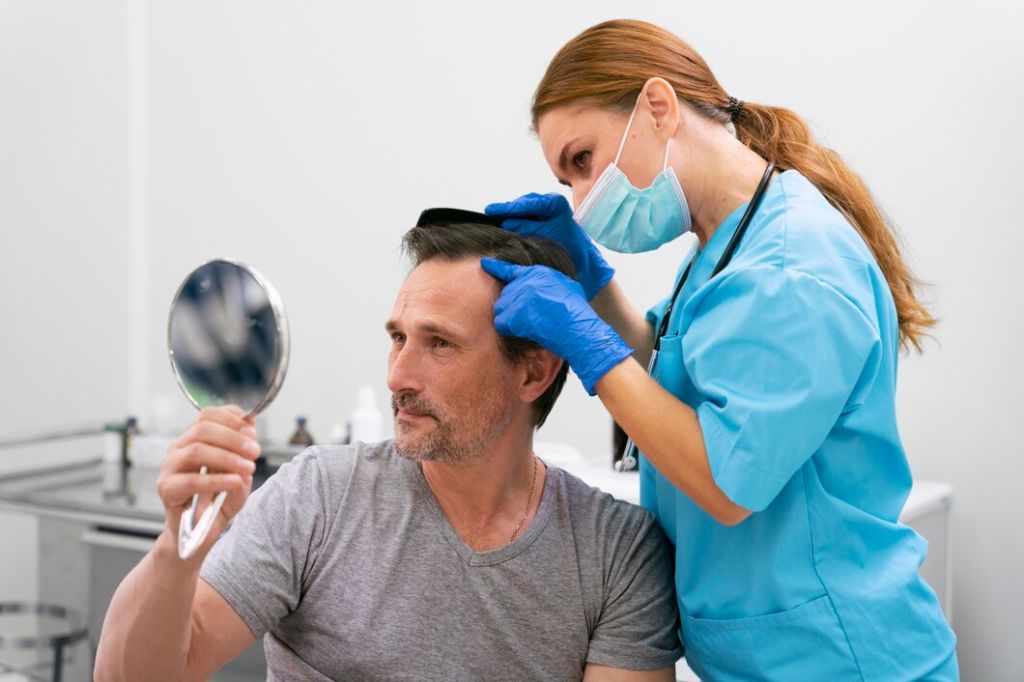Scalp health is often overlooked, yet it plays a crucial role in overall well-being. From dandruff and hair loss to scalp infections and psoriasis, various conditions can affect the scalp, causing discomfort and impacting self-esteem. Sydney scalp analysis and nurse-led procedures offer a personalised approach to addressing these issues, ensuring effective and compassionate care.
Understanding the Role of Nurses in Scalp Care
Nurses are highly skilled healthcare professionals who play a vital role in managing scalp conditions. Their expertise in assessing, diagnosing, and treating various scalp issues enables them to provide comprehensive and patient-centred care.
Key Nurse-Led Procedures for Scalp Health
Scalp Assessment
Comprehensive Evaluation
Nurses conduct thorough assessments, including medical history reviews and symptom analysis, to identify underlying causes of scalp problems, such as underlying medical conditions like psoriasis or eczema, lifestyle factors like stress or poor diet, or product sensitivities to specific hair care products or chemicals.
Visual Examination
They examine the scalp for signs of inflammation, redness, scaling, or hair loss, using specialised tools like a dermatoscope to magnify and analyse the scalp’s surface for microscopic changes.
Hair Analysis
Nurses assess hair texture, thickness, and growth patterns to gain insights into potential issues like hormonal imbalances, nutrient deficiencies, or genetic predisposition to hair loss.
Scalp Cleansing and Treatment
Gentle Cleansing
Nurses recommend and administer appropriate cleansing products to remove excess oil, dirt, and product buildup without irritating the scalp.
Targeted Treatments
They may apply medicated shampoos, conditioners, or topical treatments to address specific scalp conditions, such as dandruff, psoriasis, or seborrheic dermatitis.
Scalp Massage
Gentle scalp massage can improve blood circulation, relax the scalp muscles, and promote hair growth.
Hair Loss Management
Identifying Causes
Nurses work with patients to determine the underlying causes of hair loss, such as hormonal imbalances, stress, medical conditions, or nutritional deficiencies. They conduct thorough assessments, including medical history reviews, physical examinations, and laboratory tests to pinpoint the root cause of hair loss.
Personalised Treatment Plans
They develop tailored treatment plans that may include medications, lifestyle modifications, hair restoration procedures, or a combination of these approaches. By considering factors like the severity of hair loss, the patient’s overall health, and their individual preferences, nurses can create effective and personalised treatment strategies.
Emotional Support
Nurses provide emotional support and counselling to help patients cope with hair loss and its psychological impact, such as feelings of self-consciousness, anxiety, or depression. They can offer coping strategies, connect patients with support groups, or refer them to mental health professionals for additional support.
Scalp Infection Management
Prompt Assessment
Nurses quickly assess scalp infections to determine the severity and underlying cause, including evaluating symptoms like redness, swelling, pain, and hair loss.
Antimicrobial Therapy
They administer appropriate antimicrobial treatments, such as topical or oral medications, to eradicate the infection, considering factors like the type of organism causing the infection and the patient’s overall health.
Infection Prevention
Nurses educate patients on preventive measures to reduce the risk of future infections, such as proper hygiene practices, avoiding sharing hair brushes or combs, and treating any underlying skin conditions that may increase susceptibility to infection.
The Benefits of Nurse-Led Scalp Care
Personalised Approach
Nurses tailor treatment plans to individual needs and preferences, ensuring optimal outcomes. By considering factors such as hair type, lifestyle, and medical history, nurses can develop highly customised care plans. This personalised approach enhances patient satisfaction and leads to more effective treatment, particularly in the context of nurse led procedure.
Early Intervention
Early detection and intervention can prevent the progression of scalp conditions and minimise complications. By recognising early signs of scalp issues, nurses can initiate timely treatment to halt the progression of the condition. This proactive approach can significantly reduce the severity of symptoms and the need for more intensive therapies.
Comprehensive Care
Nurses address not only the physical symptoms but also the emotional impact of scalp issues. In addition to providing medical treatments, nurses offer emotional support and counselling to help patients cope with the psychological distress associated with scalp conditions. This holistic approach improves overall well-being and promotes a positive outlook.
Accessibility and Convenience
Nurse-led clinics offer convenient access to expert care, reducing the need for referrals to specialists. By providing accessible and convenient care, nurse-led clinics eliminate the need for long wait times and multiple appointments. This streamlined approach saves patients time and reduces stress.
Cost-Effective Solutions
Nurse-led procedures often provide cost-effective alternatives to traditional medical treatments. By offering affordable and effective treatments, nurse-led clinics make quality scalp care accessible to a wider range of patients. This cost-effective approach helps alleviate financial burdens and ensures that everyone can receive the care they need.
Conclusion
Nurse-led procedures offer a valuable and effective approach to managing scalp issues. By providing personalised care, early intervention, and comprehensive treatment plans, nurses empower individuals to achieve healthy, beautiful hair and a renewed sense of confidence. From dandruff and dryness to hair loss and scalp infections, nurses can diagnose and treat a variety of scalp conditions. If you are experiencing scalp concerns, consider seeking the expertise of a nurse to receive tailored care and support.

